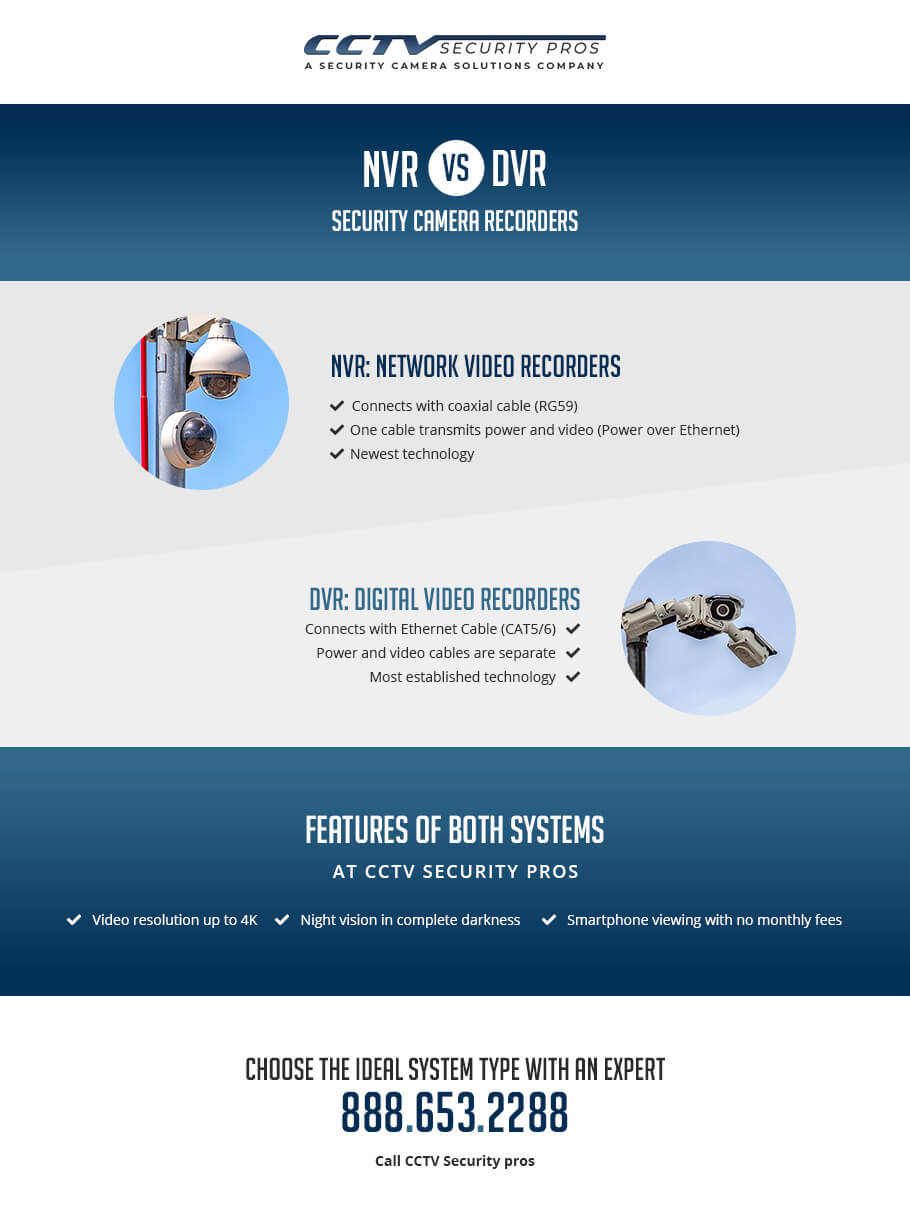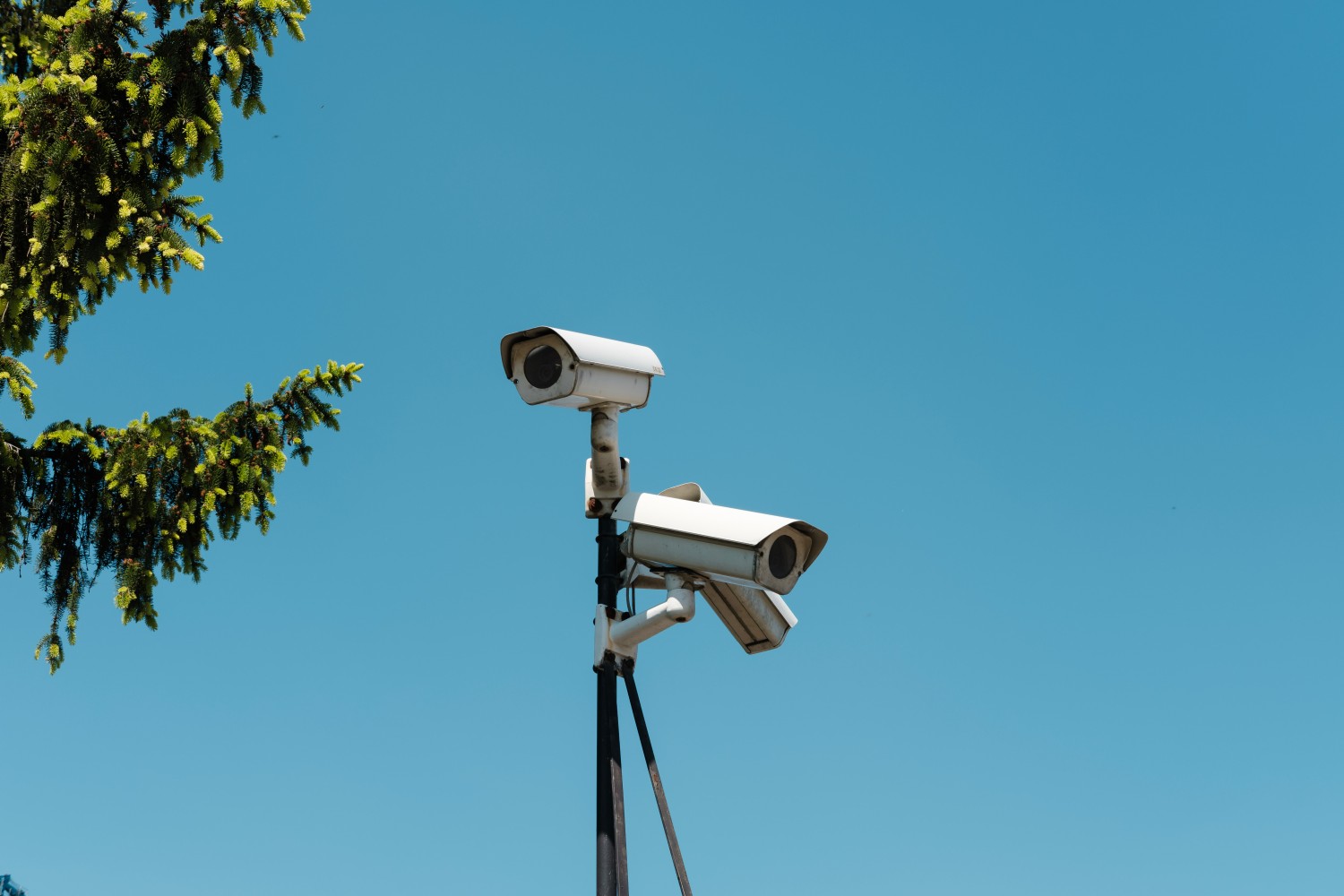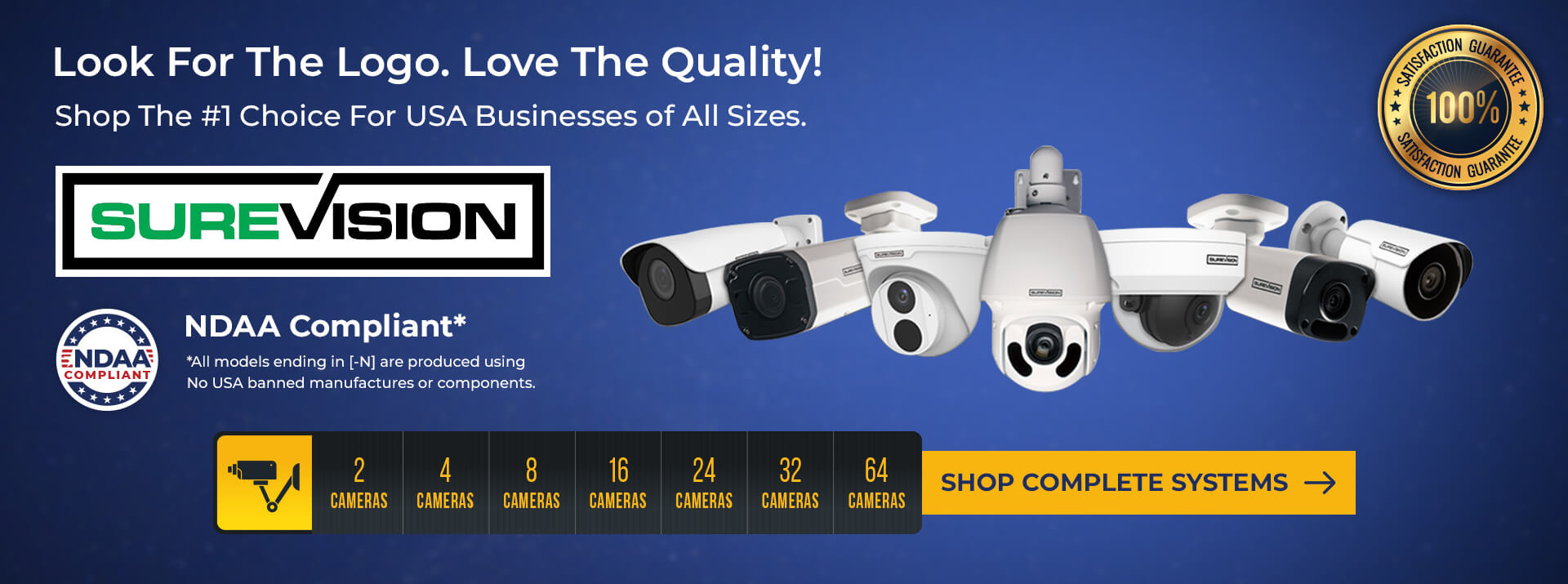NVR vs DVR: The Differences Between Security Camera Recorders
Posted by Gregory DeRouanna on Jul 6, 2020
For the best surveillance capability on your business or property, you need a reliable approach to evaluating the superior system, including picture and video quality, power consumption, and price. The first step is deciding between two major camera options - Network Video Recording (NVR) and Digital Video Recording (DVR).
Knowing the difference between DVR and NVR is a crucial first step to the process. See the difference between NVR vs DVR security camera systems below.

Use our information here to determine and order the best camera system for your property, or contact us at CCTV Security Pros. Get help from surveillance experts by calling 888.653.2288.
How Security Camera Recorders Work
NVRs and DVRs by CCTV Security Pros both allow for managing, viewing, recording, and storing live or archived surveillance footage from connected cameras. You can access all these functions from any device.
- DVRs - Connect to their cameras with a coaxial cable (RG59) and have a separate cord for power. Many older buildings are pre-wired for these types of systems.
- NVRs - Connect to their cameras with Ethernet Cable (CAT5/6). They only use one cable for power and video. This is called Power Over Ethernet technology (PoE)
Each of these video recording systems comes with pros and cons, including the video quality of the cameras they support. Before directly comparing NVRs vs DVRs, ask these questions to help determine your monitoring needs.
Determining the Right System
- What do I want to protect or monitor?
- How do I want to install my security cameras or system?
- What hardware am I dealing with?
- Who will be maintaining my surveillance network?
- Who needs to access my security system?
- How big is my property?
- How many security cameras do I need?
- How best can I monitor the security cameras?
- What is my budget?
The answers to these questions can help you understand the benefits of NVR vs DVR systems, what security surveillance features you want, the best way to install your security cameras, and how big of a system you need. From there, you can determine which is best for your needs based on the differences between DVR and NVR systems.
HVR Recorder Systems
You may have heard the term HVR in your research for the best security camera recorder. These are Hybrid Video Recorders that can accept video from cameras of multiple types, though these system types are not recommended.
DVR & NVR Power Consumption
Both DVR and NVR systems consume a similar amount of power, typically less than 10 watts per camera. The difference in power consumption comes with the features. Infrared night vision and higher quality (4K) video will demand more power. In comparing NVR vs DVR surveillance systems, both support these capabilities, but NVR systems more readily feature them.

NVR vs DVR Differences Outlined
NVR Basics
NVRs are the heart of today’s advanced IP security camera systems. Surveillance technology has greatly improved in just a few short years, with NVRs now a mainstay in home and business surveillance. These recorders are designed to be used with IP security cameras. They rely on Power-over-Ethernet technology and transmit power and video over CAT5/6 Ethernet cables. When it comes to NVR vs DVR, NVR is the more streamlined of the two.
NVR Technology
To really understand if NVR is better than DVR, you have to understand its underlying video technology. NVRs use PoE technology to encode and process video data in IP security cameras, which then stream the data to the video recorder, which saves the video footage. One major difference between DVRs and NVRs is how the video footage is transmitted. Unlike DVRs, video footage is transmitted to the NVR via the same network infrastructure as your internet access.
NVR Picture Quality
In the battle of NVR vs DVR, NVR wins out in its picture quality support. NVRs support extremely high-resolution security cameras - up to 4K Ultra HD. If you’re looking to upgrade from analog systems or want a new security system with IP security cameras, you’ll need a professional-grade NVR so you can enjoy the full functionality and use of a complete surveillance system. These recorders are ideal for use where enhanced security is needed.
NVR Key Features
As we continue analyzing the difference between DVR and NVR security camera recorders and look at NVR vs DVR systems, here are some key features of network video recorders and their cameras:
- Crystal clear surveillance video up to 4K Ultra HD picture quality
- Remote viewing of live or recorded video via PC, smartphones, and tablets with no monthly fees
- Easy-to-use and fully-functional web interface
- Options for recording video footage 24/7, on schedule, or on motion detection
- Easily view, record, playback, and retrieve time and date-stamped video footage
- Compatible with different types of security cameras
- More advanced H.265 video compression technology that produces better video quality at the use of less storage and bandwidth
- Surveillance-grade hard drives for storing recorded video footage
- Multiple Hard Drive Bays to support your storage needs
- External POE Switch that supports multiple cameras (Up to 64 security cameras)
- 200 Mbps Incoming Bandwidth
- HDMI and VGA Display Output for increased functionality
There are a few more benefits to NVRs in the comparison between NVR vs DVR systems.
DVR Basics
DVRs record both analog security cameras and HD-over-Coax security cameras. A key difference between DVR and NVR security camera recorders is that with DVRs, each camera requires two cables, one for power and another for transmission of audio and video footage. DVRs support security cameras with a resolution of 1080p and are hardwired. These recorders are tried-and-true security systems and are still used by millions of businesses.
Many buildings come pre-wired for DVRs. They’re considered the “old standard” for video surveillance, although they lack some of the extra features that IP systems and NVRs offer. They’re perfect for enhancing an analog system with better cameras and more modern features without changing the wiring.
DVR Key Features
To fully grasp the difference between DVR and NVR security camera recorders, here are the key features of digital video recorders:
- HD security camera DVRs deliver up to 1080p video recording, with some models allowing higher resolution recordings
- Live remote viewing via PC, smartphones, and tablets
- Multiplex surveillance with live footage viewing, video footage playback, 24/7 recording and storage of surveillance video, simultaneously
- Reliable surveillance monitoring and motion detection capabilities
- Easy retrieval of the recorded surveillance footage - date & time stamped
- Pre-installed surveillance-grade hard drives for reliable video storage
- User-friendly surveillance monitoring interface for streamlined and simplified setup, installation, and management of your DVR security system
NVR vs DVR Pros and Cons

NVR Pros
- Higher Video - When looking at the difference between DVR and NVR, you’ll see that NVRs support security camera resolutions ranging from 2MP to 12MP and higher - that’s 1080p HD, 2K to even 4K Ultra HD. This makes NVRs perfect for use at any property requiring high-end security.
- More Convenient - NVRs are more convenient compared to DVRs. The use of IP protocol ensures easy installation. Wi-Fi NVRs connect with security cameras wirelessly.
- Flexible Placement - NVRs can be placed virtually anywhere with network availability.
- Easy to Use and Configure - Thanks to PoE technology, NVRs can locate and connect to any IP security cameras on the same network automatically.
- For NVR vs DVR, NVR’s biggest draws are convenience and picture quality.
NVR Cons
- Cost - Another difference between DVR and NVR security camera recorders is that NVRs are more expensive to install than DVRs, especially for new installations or upgrades from analog systems. The good news is, they’re cost-effective in the long run.
- Compatibility Issues - Not all IP security cameras are compatible with NVRs from other brands, so choose wisely. Buy your security cameras and video recorder from the same brand to avoid compatibility issues.
DVR Pros
- Cheaper - There’s a major cost difference in NVR vs DVR security camera recorders. DVRs are much cheaper to install than NVRs.
- Superior Compatibility - DVRs are compatible with analog and HD-over-coax cameras as well as other DVRs.
DVR Cons
- Image Quality is Lower, But is Improving - DVRs deliver lower quality images, but with megapixel security cameras and improved video recording capabilities, users can now enjoy 1080p and higher resolutions.
- Higher Maintenance Cost - DVRs transmit video signals via coaxial cables, which are more vulnerable to various environmental factors. DVR systems have a higher maintenance cost.
- Surveillance Equipment Must Be Close Enough - With DVR vs NVR, the DVR analog or HD-over-coax security cameras have to be within at least 300 ft from the recorder’s location. If not, the signal will be weaker, and the image quality will be lower.
Equip Your Property Reliably
Now that you have all the info on the differences between DVR and NVR surveillance systems, you can make an informed decision on what to equip your property with. NVRs offer better camera quality, stability, and efficient power consumption. DVRs are better priced and backward compatible with already in place systems. When it comes to the question of NVR vs DVR, there’s no clear answer. You know what benefits will best suit you.
If you’re still confused about which is better or how to get started on your upgrade, call us at 888.653.2288 to get in touch with a security expert. See why CCTV Security Pros is trusted by over 60,000 customers, and get the best security for your business or property today.




